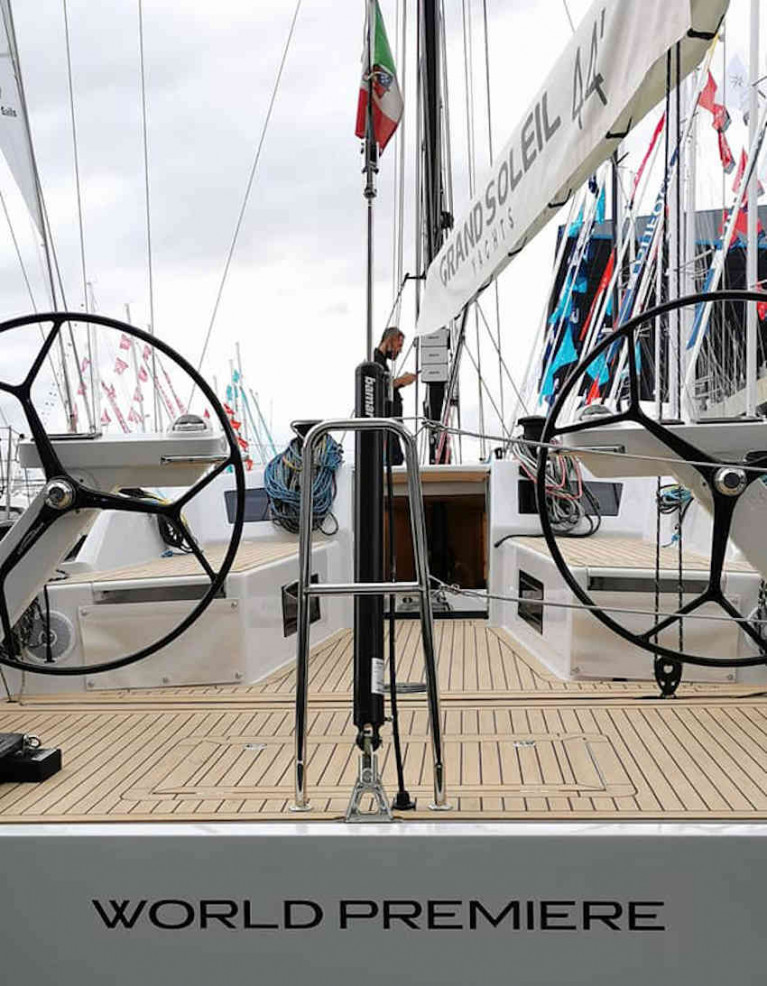Displaying items by tag: Genoa Boat Show
Grand Soleil’s GS44 Performance Premieres At Genoa Boat Show
Following its announcement this past January at boot Düsseldorf, Grand Soleil’s new 44 Performance model has enjoyed its world premiere at the Genoa Boat Show in Italy.
The Grand Soleil 44 already has an impressive pedigree, with Nieulargo and Eleuthera among the familiar race-winning names in Irish waters.
The Performance version promises even more, and Mark Mansfield of Kay Yachting previously outlined the combination of comfort, cruising and racing excellence that the Grand Soleil 44 Performance epitomises.
For further details on this or any other vessel in the Grand Soleil range, contact Mark at [email protected] or 087 250 6838.
Volvo Ocean Race Teams To Square Off In Genoa Later This Month
#VOR - Volvo Ocean Race rivals Team SCA and Team Vestas Wind will go head-to-head once more in a series of pro-am races at the Genoa Boat Show from September 30 to October 5.
The six pro-am races will give the race’s many Italian fans the first chance to see VOR boats on home waters and provide an intriguing challenge for the crews of Team Vestas Wind and Team SCA, which will be named at a later date.
The teams will be matched in two daily pro-am in-port races on 30 September 30, 1 and 2 October before they join a Genoa Boat Show fleet race on Saturday 3 October.
Team Vestas Wind skipper Chris Nicholson, whose Danish-backed challengers memorably bounced back from near disaster in the second leg last November when the boat was grounded on a reef in the Indian Ocean – recorded on the spot by the boat's Irish onboard reporter Brian Carlin – was very much looking forward to taking on Team SCA’s all-women crew again.
“The last time we were in Genoa, we were on our way to Persico Marine to repair our Volvo Ocean 65, so it’s very special to be able to be back in Italy racing our boat,” said Nicholson.
“The Vestas Wind is in great condition and the team still has much more to give, as fans saw when we returned ahead of Leg 8 of the Volvo Ocean Race in Lisbon. I’m proud to represent Vestas at the Genoa Boat Show and look forward to competing against Team SCA once more,” he continued.
After the race finished in Gothenburg on 27 June, the blue boat sailed via its home port of Copenhagen to Race HQ in Alicante, Spain for routine maintenance. It will depart for Genoa the weekend before the Genoa Boat Show starts on 30 September.
They will face stiff competition in Genoa from Team SCA, who finished third overall in the In-Port Race Series of the Volvo Ocean Race and then beat event rivals Dongfeng Race Team in the Artemis Challenge during Cowes Week last month. They impressed too during the Fastnet Race, also held during the traditional sailing festival on the Isle of Wight.
Anton Albertoni, president of the Genoa Boat Show’s organizing body I Saloni Nautici, said he was delighted to welcome the two crews to Genoa.
“The Volvo Ocean Race brings the pinnacle of offshore racing to the Genoa Boat Show,” he said. “For the show's visitors, though, this is not an invitation to dare but to meet those men and women who have made the sea their passion, their lifestyle, their daily pleasure.
"Those who face such challenges have the ocean at heart and having them in Genoa represents a true celebration of the sea. That's why we are very happy to welcome the women from Team SCA and the men from Team Vestas Wind.
“Moreover, the Volvo Ocean 65s have been built and fitted with some of the best Italian marine technology and the Genoa Boat Show is all about Made in Italy.”
Team SCA squad member Carolijn Brouwer added: “It was great to have the team back together again for the Fastnet Race, and we were happy with our performance.
"We look forward to once again locking horns with Team Vestas Wind, and meeting many of our Italian supporters at the Genoa Boat Show."






























































